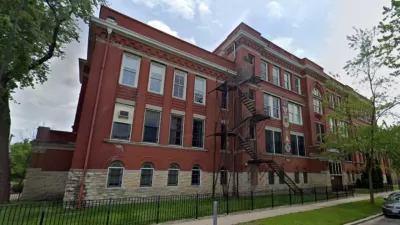Why would Whole Foods—a company colloquially known as "Whole Paycheck" and as a staple of wealthy neighborhoods—open an 18,000-square-foot location in one of the most impoverished parts of Chicago?
According to Emily Badger, "last year, to the disbelief of many, [Whole Foods] announced plans to open a store in 2016 here [in Englewood], in one of Chicago’s most economically depressed neighborhoods."
Reasonable people might assume that the store's opening is a sign of Englewood's eventual gentrification. According to the article, however, "that is not likely to happen in Englewood, at least not any time soon. Whole Foods is planning to sell olive oil and snap peas to the people who live here now. It is also planning, in the process, to make money."
Badger goes on to describe a bit more about the neighborhood's past, present, and the strategic decision to site the Whole Foods market in the hopes of catalyzing the future of the neighborhood. The plan for the development, for instance, includes the help of an urban farm a mile-and-a-half away, run by a nonprofit group called Growing Home.
FULL STORY: Why Whole Foods is moving into one of the poorest neighborhoods in Chicago

Planetizen Federal Action Tracker
A weekly monitor of how Trump’s orders and actions are impacting planners and planning in America.

Maui's Vacation Rental Debate Turns Ugly
Verbal attacks, misinformation campaigns and fistfights plague a high-stakes debate to convert thousands of vacation rentals into long-term housing.

Restaurant Patios Were a Pandemic Win — Why Were They so Hard to Keep?
Social distancing requirements and changes in travel patterns prompted cities to pilot new uses for street and sidewalk space. Then it got complicated.

In California Battle of Housing vs. Environment, Housing Just Won
A new state law significantly limits the power of CEQA, an environmental review law that served as a powerful tool for blocking new development.

Boulder Eliminates Parking Minimums Citywide
Officials estimate the cost of building a single underground parking space at up to $100,000.

Orange County, Florida Adopts Largest US “Sprawl Repair” Code
The ‘Orange Code’ seeks to rectify decades of sprawl-inducing, car-oriented development.
Urban Design for Planners 1: Software Tools
This six-course series explores essential urban design concepts using open source software and equips planners with the tools they need to participate fully in the urban design process.
Planning for Universal Design
Learn the tools for implementing Universal Design in planning regulations.
Heyer Gruel & Associates PA
JM Goldson LLC
Custer County Colorado
City of Camden Redevelopment Agency
City of Astoria
Transportation Research & Education Center (TREC) at Portland State University
Jefferson Parish Government
Camden Redevelopment Agency
City of Claremont



























